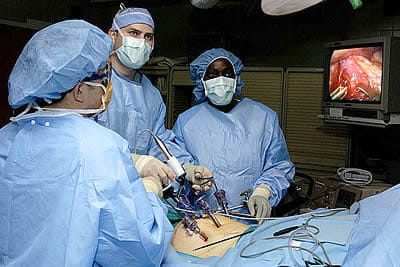Laparoscopic Surgery - Abu Dhabi - Dubai
Laparoscopic surgery, also known as minimally invasive surgery or keyhole surgery, is a surgical technique that uses small incisions and specialized instruments to perform procedures inside the body. It is widely used in various medical fields, including general surgery, gynecology, urology, and gastrointestinal surgery.
During a laparoscopic procedure, the surgeon makes several small incisions, typically around half an inch to an inch in length, in the abdomen. A laparoscope, which is a thin, long tube with a light and camera attached to it, is inserted through one of the incisions. The camera allows the surgeon to visualize the internal organs on a monitor.
Additional small incisions may be made to insert other surgical instruments, such as dissectors, graspers, scissors, or staplers, depending on the specific procedure. The surgeon manipulates these instruments from outside the body to perform the necessary surgical tasks.
The benefits of laparoscopic surgery over traditional open surgery include:
- 1. Reduced trauma and scarring: The small incisions result in less damage to surrounding tissues and muscles, leading to smaller scars and potentially less pain.
- 2. Faster recovery: Since laparoscopic surgery causes less trauma, patients often experience shorter hospital stays and quicker overall recovery times compared to open surgery.
- 3. Reduced blood loss: The smaller incisions and specialized instruments used in laparoscopic surgery typically result in less bleeding during the procedure.
- 4. Lower risk of complications: Laparoscopic surgery is associated with a lower risk of postoperative infections, hernias, and other complications.
- 5. Improved cosmetic outcomes: The smaller incisions and reduced scarring can result in improved cosmetic outcomes, which can be particularly important in procedures performed in visible areas, such as gynecological surgeries.
Laparoscopic surgery can be used for a wide range of procedures, including but not limited to:
- 1. Cholecystectomy (gallbladder removal)
- 2. Appendectomy (appendix removal)
- 3. Hernia repair
- 4. Gynecological procedures (e.g., hysterectomy, ovarian cyst removal)
- 5. Colorectal surgery
- 6. Bariatric surgery (weight loss surgery)
- 7. Diagnostic procedures (e.g., exploration, biopsy)
It's important to note that not all surgeries are suitable for laparoscopic approaches, and the decision to perform a laparoscopic procedure depends on various factors such as the patient's overall health, the complexity of the case, and the surgeon's expertise.

